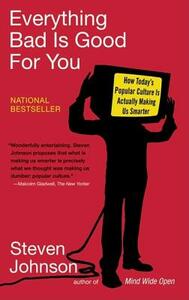Take a photo of a barcode or cover
86 reviews for:
Everything Bad Is Good for You: How Today's Popular Culture Is Actually Making Us Smarter
Steven Johnson
86 reviews for:
Everything Bad Is Good for You: How Today's Popular Culture Is Actually Making Us Smarter
Steven Johnson
Um livro que realmente gostei. Uma boa defesa de como a cultura em geral (séries, jogos, filmes, quadrinhos, etc) está ficando mais complexa. E como ainda nos prendemos em achar que qualquer atividade de lazer que não for a leitura fará mal para as crianças. O autor ainda toma o cuidado de deixar claro que nem tudo contribui para a cognição e cobre o outro lado, atividades que vão pelo menor denominador comum e mediocridade. Excelente para quem frequenta novas mídias e consome entretenimento (todo mundo).
I really enjoyed reading this book. It validated my TV habit and also gave me some insight in to why some people have a more difficult time learning technology than do I. Interesting.
interesting research on the benefits of video games and television.
This book is so much fun! And Steven Johnson is (mostly) convincing me that video games involve important decision-making skills and delayed rather than instant gratification, the internet involves important social skills and encourages personal expression, TV more and more involves emotional intelligence as well as mental organizational and detective work, etc. Not a lot of hard sciences here -- this is like an even fluffier Malcolm Gladwell book, but as an opinion piece it's nicely organized and well-written (save a couple weirdly incomplete sentences). I'm really enjoying it!
Johnson is the anti-Keen. This is a balanced, reasoned, sensible, non-knee-jerk look at innovations and developments in entertainment technology and the effects they have on our brains. He looks at just a few aspects of video games, tv, and the internet, and acknowledges this. The tone of the book is such a relief after Keen's elitist "worship me" stance.
challenging
hopeful
slow-paced
Poorly argued, poorly researched, with questionable observations, but a nugget of something interesting. Vaguely entertaining. I say this as a life long gamer and defender of interactive media (and with a degree in psych).
Many, many observations built on premises that start with 'we all know everyone thinks this, but actually' with the possibility of a quote being thrown in sporaticly. I read half before needing to walk away, most every page being marked up in red pen.
To give you the gist, let's examine one of the big early ideas; and it is an attempt to reconcetalize games as not being about instant gratification, but delayed gratification; that is, they teach people to work towards a long term goal without any reward; ie, grinding for some high level.
The problem is, this fundamentally misunderstands how gaming systems operate; they *are* instant gratification, because you get xp every time. You get a small gold reward every time. You have a clear indicator as to the progress you are making, with a clear goal that is to met at the end of that goal; which very, very rarely mimics real life. The book is rife with misconceptions like this that feel more like 'gotcha!' than they do 'I have a different take on this thing.
Is it abysmall garbage? No. Is it worth reading if your very interested in the material and some hot takes?
...sure? This book feels like the literally equivalent of browsing reddit.
Many, many observations built on premises that start with 'we all know everyone thinks this, but actually' with the possibility of a quote being thrown in sporaticly. I read half before needing to walk away, most every page being marked up in red pen.
To give you the gist, let's examine one of the big early ideas; and it is an attempt to reconcetalize games as not being about instant gratification, but delayed gratification; that is, they teach people to work towards a long term goal without any reward; ie, grinding for some high level.
The problem is, this fundamentally misunderstands how gaming systems operate; they *are* instant gratification, because you get xp every time. You get a small gold reward every time. You have a clear indicator as to the progress you are making, with a clear goal that is to met at the end of that goal; which very, very rarely mimics real life. The book is rife with misconceptions like this that feel more like 'gotcha!' than they do 'I have a different take on this thing.
Is it abysmall garbage? No. Is it worth reading if your very interested in the material and some hot takes?
...sure? This book feels like the literally equivalent of browsing reddit.
He may have said "everything" but it's mostly about video game playing and use of electronic gadgets. If you're not concerned with those things, most of this book is not applicable.
Interesting. It's not the end of the world as we know it. Ultimately, not that memorable.




